| Srl | Item |
| 1 |
ID:
090834


|
|
|
|
|
| Publication |
2009.
|
| Summary/Abstract |
Some European constitutions give cabinets great discretion to manage their own demise, whereas others limit their choices and insert the head of state into decisions about government termination. In this article, we map the tremendous variation in the constitutional rules that govern cabinet termination and test existing expectations about its effects on a government's survival and mode of termination. In doing so, we use the most extensive government survival data set available to date, the first to include East and West European governments. Our results demonstrate that constitutional constraints on governments and presidential influence on cabinet termination are much more common than has previously been understood and have powerful effects on the hazard profiles of governments. These results alter and improve the discipline's understanding of government termination and durability, and have implications for comparative work in a range of areas, including the survival and performance of democracies, electoral accountability, opportunistic election calling, and political business cycles.
|
|
|
|
|
|
|
|
|
|
|
|
|
|
|
|
| 2 |
ID:
111666
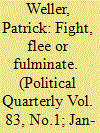

|
|
|
|
|
| Publication |
2012.
|
| Summary/Abstract |
Prime ministers often have to work with prime ministerial aspirants, senior ministers who regard themselves as possible successors. But can these challengers seize the job when the prime ministers are reluctant to stand down? Using evidence from Canada, Britain and Australia, the article explores the conditions in which successions have taken place and the capacity of the prime ministerial aspirants to expedite the process. It identifies three alternative strategies that are shaped by the party rules in the different countries. The aspirants may flee, fight or fulminate. Which strategy will best improve their chances of winning the top job depends on the traditional or developing modes of leadership election that their parties have adopted. Some processes provide the means to assassinate the leader. Others have no opportunity to act; rivals can do nothing but wait, either in or outside parliament. The article finds that the broader the constituency that elects the leaders, the more secure those leaders are when their reputation declines.
|
|
|
|
|
|
|
|
|
|
|
|
|
|
|
|
| 3 |
ID:
178195
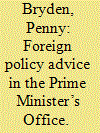

|
|
|
|
|
| Summary/Abstract |
The Department of External Affairs (DEA) has always been anomalous—more closely associated with the prime minister than any other department, yet also more independent from cabinet in its necessarily far-flung structure than any other department. The unique position of the DEA has meant that its influence has been closely tied to changes in the structure of the Prime Minister’s Office (PMO). This article examines the ways that the advisory capacity of the DEA has gradually been eroded, while the foreign policy advice from the PMO has concomitantly increased, in the period between the 1930s and the 1990s.
|
|
|
|
|
|
|
|
|
|
|
|
|
|
|
|
| 4 |
ID:
172623
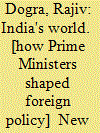

|
|
|
|
|
| Publication |
New Delhi, Rupa Publications India Pvt Ltd, 2020.
|
| Description |
xxix, 218p.hbk
|
| Standard Number |
9789389967401
|
|
|
|
|
|
|
|
|
|
|
|
Copies: C:1/I:0,R:0,Q:0
Circulation
| Accession# | Call# | Current Location | Status | Policy | Location |
| 059888 | 327.54/DOG 059888 | Main | On Shelf | General | |
|
|
|
|
| 5 |
ID:
174014
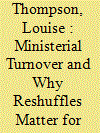

|
|
|
|
|
| Summary/Abstract |
Reshuffles are a relatively common occurrence in British politics. We expect to see them whenever a new Prime Minister enters Downing Street, after elections and following ministerial resignations. Recent research from the Institute for Government warns that the regular churn of ministers has negative consequences for policy making and for parliamentary accountability. This article summarises their latest research and what this tells us about the potential implications of Boris Johnson’s February 2020 reshuffle on government and Parliament.
|
|
|
|
|
|
|
|
|
|
|
|
|
|
|
|
| 6 |
ID:
103544


|
|
|
|
|
| Publication |
2011.
|
| Summary/Abstract |
The article reports the results from the latest survey of academic experts polled on the performance of post-1945 prime ministers. Academic specialists in British politics and history rate Clement Attlee as the best postwar prime minister, with Margaret Thatcher in second place just ahead of Tony Blair in third place. Gordon Brown's stint in Number 10 was the third-worst since the Second World War, according to the respondents to the survey that rated his premiership as less successful than that of John Major. The article compares public and academic opinion and rankings of prime ministers and their performance, noting significant discrepancies in contemporary and retrospective evaluations. Academic respondents to the survey also provided detailed ratings and evaluations of the performance and policy impact of the four prime ministers since 1979: Margaret Thatcher, John Major, Tony Blair and Gordon Brown.
|
|
|
|
|
|
|
|
|
|
|
|
|
|
|
|
| 7 |
ID:
158820
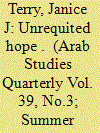

|
|
|